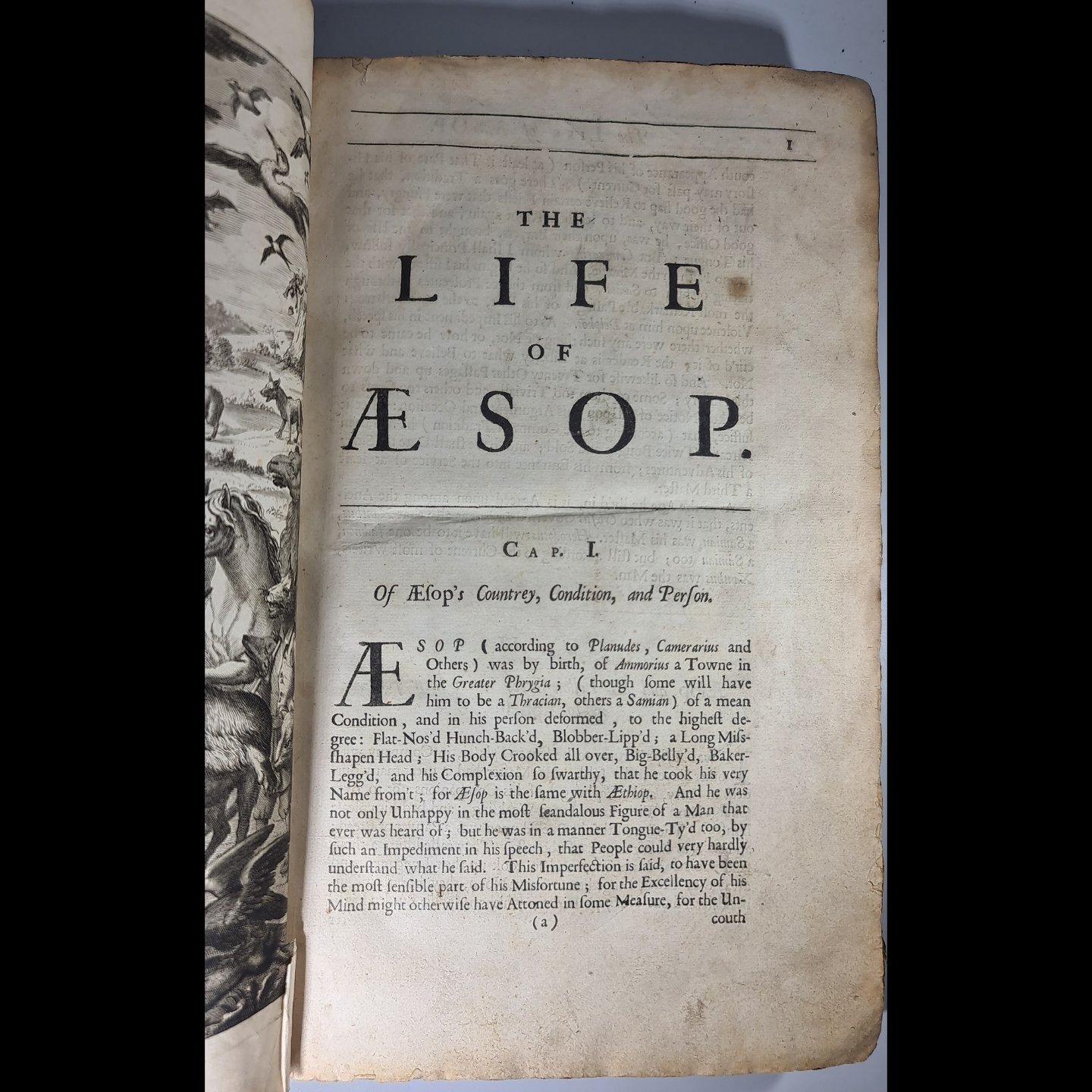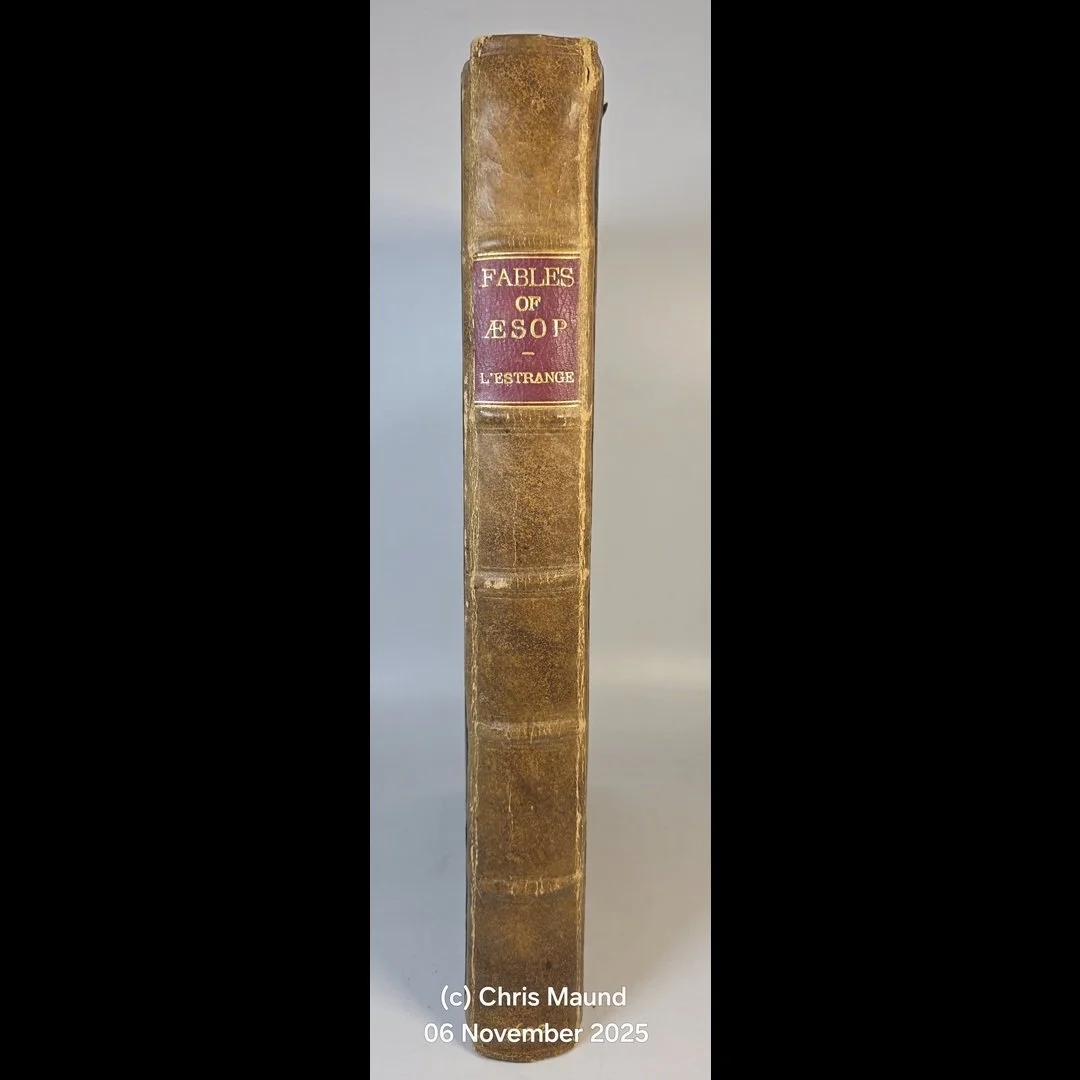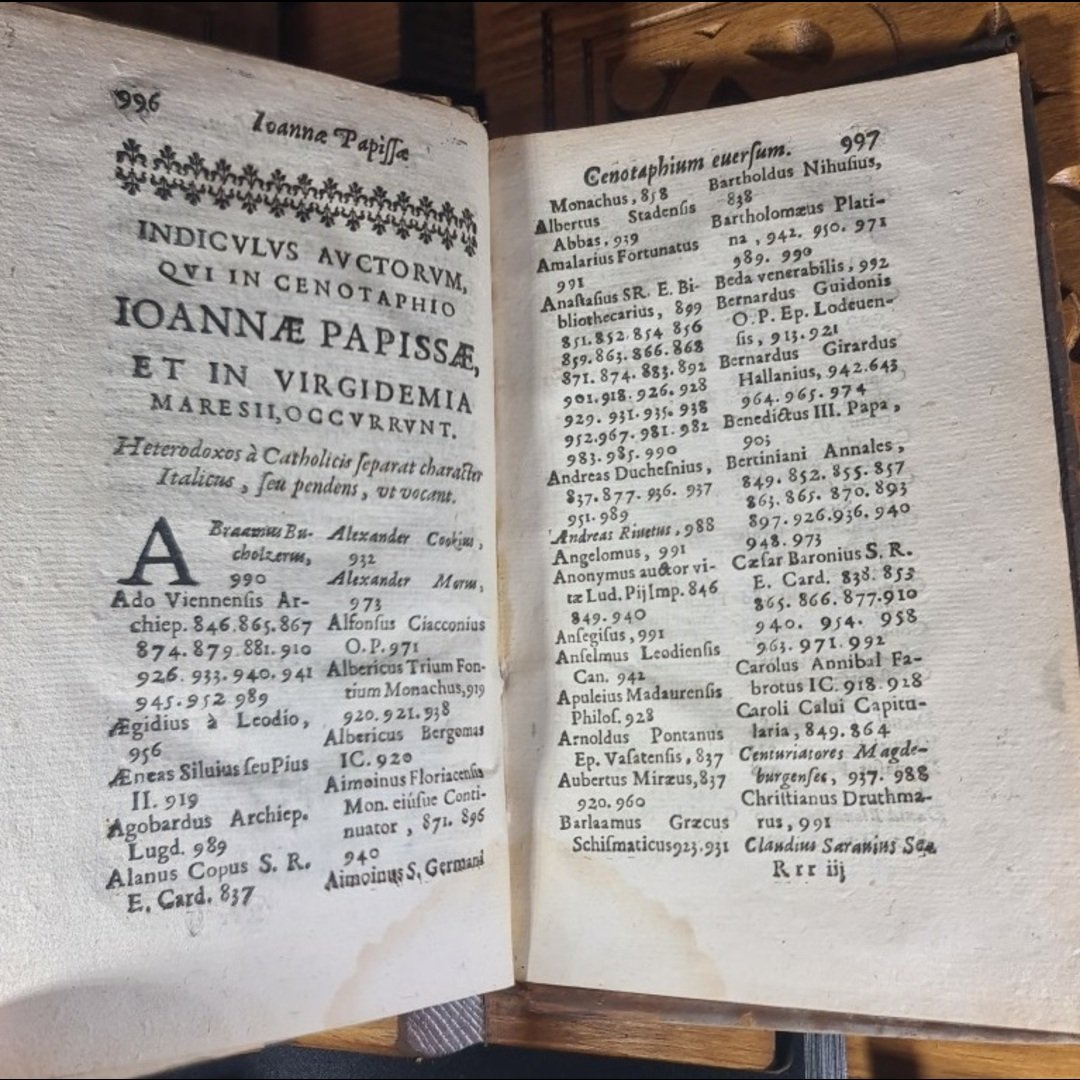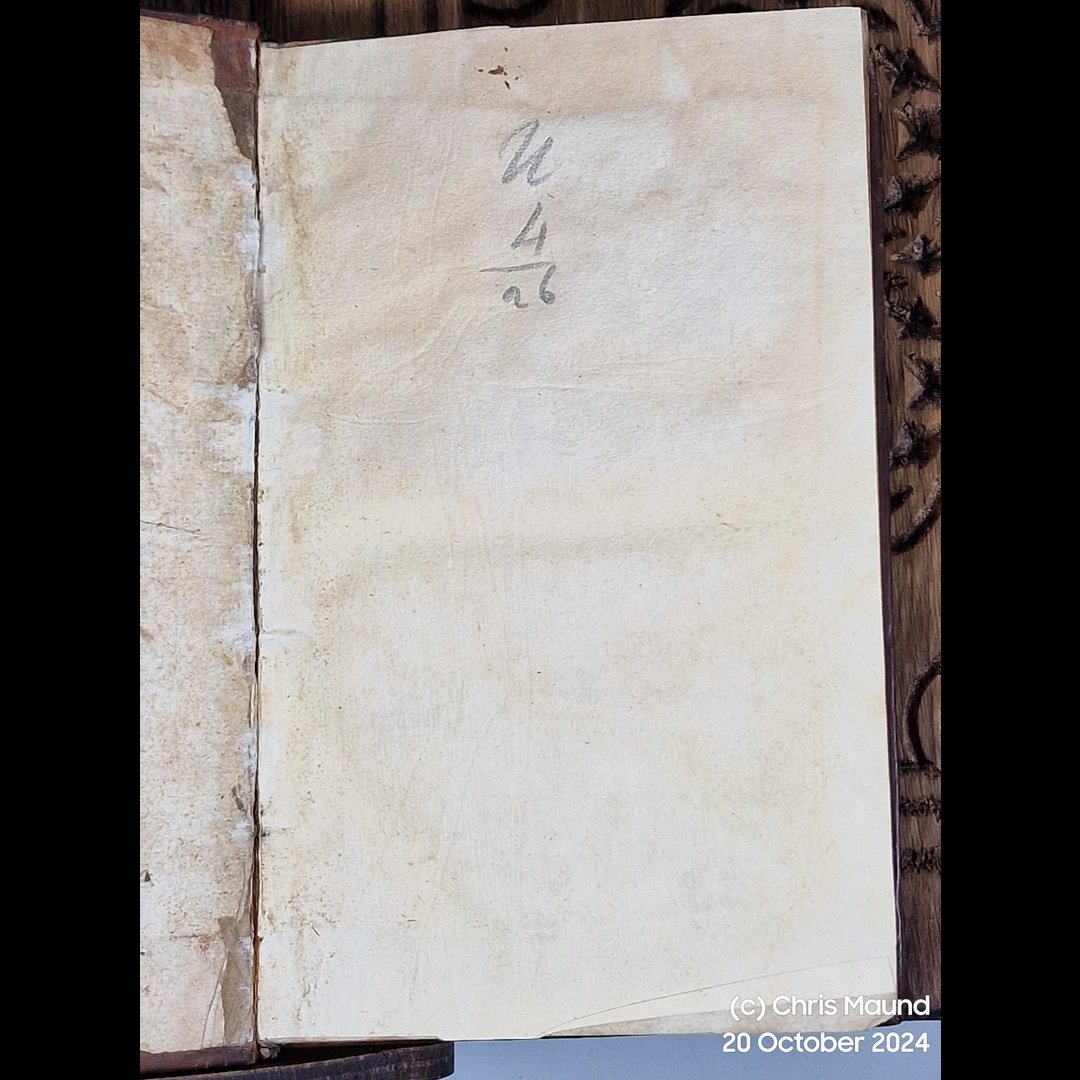 Image 1 of 13
Image 1 of 13

 Image 2 of 13
Image 2 of 13

 Image 3 of 13
Image 3 of 13

 Image 4 of 13
Image 4 of 13

 Image 5 of 13
Image 5 of 13

 Image 6 of 13
Image 6 of 13

 Image 7 of 13
Image 7 of 13

 Image 8 of 13
Image 8 of 13

 Image 9 of 13
Image 9 of 13

 Image 10 of 13
Image 10 of 13

 Image 11 of 13
Image 11 of 13

 Image 12 of 13
Image 12 of 13

 Image 13 of 13
Image 13 of 13














1692 1st Edtn Earliest Substantial English Æsop FABLES OF AESOP By Sir Roger L'Estrange Illus. Unknown Very Good Fables
1692 1st Edition , Earliest Substantial English Æsop
FABLES OF AESOP
and Other Eminent Mythologists: With Morals and Reflections
By Sir Roger L'Estrange
Sir Roger L'Estrange (17 December 1616 – 11 December 1704) was an English pamphleteer, author, courtier, and press censor. Throughout his life L'Estrange was frequently mired in controversy and acted as a staunch ideological defender of King Charles II's regime during the Restoration era. His works played a key role in the emergence of a distinct 'Tory' bloc during the Exclusion Crisis of 1679-81. Perhaps his best known polemical pamphlet was An Account of the Growth of Knavery, which ruthlessly attacked the parliamentary opposition to Charles II and his successor James, Duke of York (later King James II), placing them as fanatics who misused contemporary popular anti-Catholic sentiment to attack the Restoration court and the existing social order in order to pursue their own political ends.
The Glorious Revolution of 1688 and the collapse of the Restoration political order heralded the end of L'Estrange's career in public life, although his greatest translation work, that of Aesop's Fables, saw publication in 1692.
Illustrated By: Unknown
Format: Hardcover, folio (fo 12 × 19 305 × 483),Pages 487
Language: English
Dust Jacket: No Jacket, Dust Jacket Condition: No Jacket
Published By: R. Sare, T. Sawbridge, B. Took, M. Gillyflower, A. & J. Churchill and J. Hindmarsh, London
Synopsis: The landmark first edition of Sir Roger L’Estrange’s influential English Æsop — one of the earliest and most substantial renderings of the fables into the English tongue, and a foundational text in the tradition of moral literature and children’s instruction, long prior to La Fontaine’s dominance in the Anglophone world.
L’Estrange’s translation is expansive, drawing not only upon Æsop but also Anianus, Abstemius, and other fabulists; each fable followed by a Moral and an extended Reflexion, offering philosophical and political interpretation in the spirited Restoration manner of its author — a vigorous royalist polemicist and Master of the Press under Charles II.
A key work in the English moral tradition; highly influential for later fabulists and early education.
SKU: BTETM0001543
Approximate Package Dimensions H: 12.5, L: 30, W: 25 (Units: cm), W: 3Kg
1692 1st Edition , Earliest Substantial English Æsop
FABLES OF AESOP
and Other Eminent Mythologists: With Morals and Reflections
By Sir Roger L'Estrange
Sir Roger L'Estrange (17 December 1616 – 11 December 1704) was an English pamphleteer, author, courtier, and press censor. Throughout his life L'Estrange was frequently mired in controversy and acted as a staunch ideological defender of King Charles II's regime during the Restoration era. His works played a key role in the emergence of a distinct 'Tory' bloc during the Exclusion Crisis of 1679-81. Perhaps his best known polemical pamphlet was An Account of the Growth of Knavery, which ruthlessly attacked the parliamentary opposition to Charles II and his successor James, Duke of York (later King James II), placing them as fanatics who misused contemporary popular anti-Catholic sentiment to attack the Restoration court and the existing social order in order to pursue their own political ends.
The Glorious Revolution of 1688 and the collapse of the Restoration political order heralded the end of L'Estrange's career in public life, although his greatest translation work, that of Aesop's Fables, saw publication in 1692.
Illustrated By: Unknown
Format: Hardcover, folio (fo 12 × 19 305 × 483),Pages 487
Language: English
Dust Jacket: No Jacket, Dust Jacket Condition: No Jacket
Published By: R. Sare, T. Sawbridge, B. Took, M. Gillyflower, A. & J. Churchill and J. Hindmarsh, London
Synopsis: The landmark first edition of Sir Roger L’Estrange’s influential English Æsop — one of the earliest and most substantial renderings of the fables into the English tongue, and a foundational text in the tradition of moral literature and children’s instruction, long prior to La Fontaine’s dominance in the Anglophone world.
L’Estrange’s translation is expansive, drawing not only upon Æsop but also Anianus, Abstemius, and other fabulists; each fable followed by a Moral and an extended Reflexion, offering philosophical and political interpretation in the spirited Restoration manner of its author — a vigorous royalist polemicist and Master of the Press under Charles II.
A key work in the English moral tradition; highly influential for later fabulists and early education.
SKU: BTETM0001543
Approximate Package Dimensions H: 12.5, L: 30, W: 25 (Units: cm), W: 3Kg
Very Good - [16], 476, [4] pp.
With the full-page engraved frontispiece of Æsop among the animals, holding a book inscribed UTILE DULCI.
Engraver uncredited — as issued. The frontispiece with animals is the correct plate for this issue. The frequently-mentioned L’Estrange portrait appears only in some copies; absence here conforms to a variant state of the first printing.
Portrait of L’Estrange by Roger White after Kneller not present in this copy (not called-for in all states of the first edition; variant issue without portrait).
Period calf boards, worn and rubbed; joints tender with evidence of early reinforcement; expected age-related toning and foxing; occasional light marginal soiling; edges untrimmed and pleasingly rough-cut; a sound and honest example of this important book.
A solid, complete and unsophisticated copy.
Boards worn, some surface loss to leather; spine dry. Textblock strong, pages generally clean with pleasing, natural toning; engraved frontispiece crisp.
No significant loss or intrusive staining; early hand-inked marginalia to a few leaves; minor worming to inner margin of preliminary leaves (not affecting text).
A very good, genuine 17th-century example of this foundational Æsop.
Wing A706
ESTC R61122
Please see photos as part of condition report







































































































